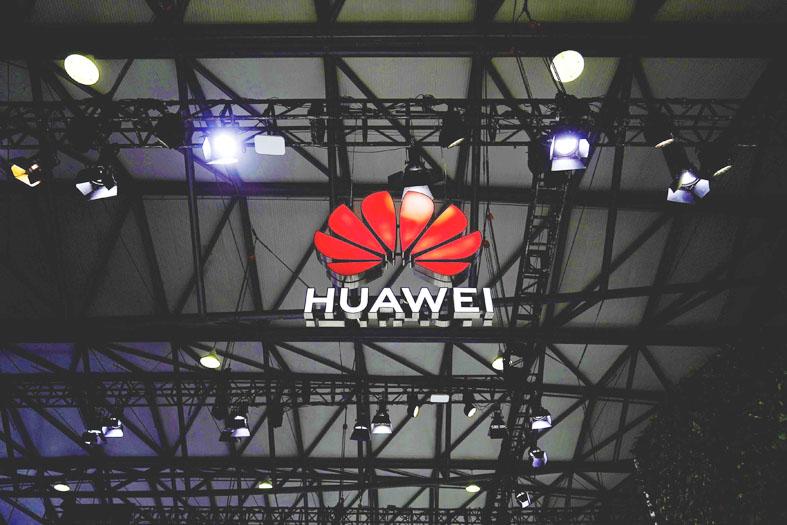The administration of US President Joe Biden has informed some suppliers to China’s Huawei Technologies Co (華為) of tighter conditions on previously approved export licenses, prohibiting items for use in or with 5G devices, people familiar with the move said.
The 5G ban is effective as of this week, said the people, who asked not to be identified to discuss nonpublic communications.
The rules create a more explicit prohibition on the export of components such as semiconductors, antennas and batteries for Huawei 5G devices, making the ban more uniform among licensees.

Photo: Reuters
Some companies had previously received licenses that allowed them to keep shipping components to Huawei that the Chinese company might have then used in 5G equipment, while other companies were already subject to tighter restrictions.
Companies had complained about confusing rules after former US president Donald Trump’s administration added Huawei to the US’ Entity List, requiring that US firms obtain government licenses if they want to sell US tech and intellectual property to the Chinese telecommunications-equipment giant.
US officials had deemed the company to be a national security threat.
The move is also a sign that the Biden administration plans to move forward on the tighter export controls implemented under Trump.
In an interview with MSNBC this month, US Secretary of Commerce Gina Raimondo promised to use the Entity List “to its full effect.”
“From one perspective, it’s cleanup and correcting mistakes from the previous administration,” said William Reinsch, who served as undersecretary of commerce for export administration in the administration of former US president Bill Clinton and is now senior adviser at the Center for Strategic and International Studies. “There’s bipartisan support for a tough line on technology transfer to China, and this reflects that.”
The US Bureau of Industry and Security, which oversees the Entity List, said in an e-mailed statement that it cannot comment on “specific export licensing questions.”
The bureau said that it “works with its interagency partners to apply consistently the licensing policies set forth in the Export Administration Regulations to protect US national security and foreign policy interests.”
The Trump administration used export controls, prohibitions and executive orders to block companies, including Huawei, chipmaker Semiconductor Manufacturing International Corp (中芯), ByteDance Ltd’s (字節跳動) TikTok and Tencent Holdings Ltd from American goods and consumers.
US Secretary of State Antony Blinken and National Security adviser Jake Sullivan are to meet with their Chinese counterparts in Alaska next week.
It would represent the highest-level in-person exchange between the two sides since Biden took office in January.
Biden and Chinese President Xi Jinping (習近平) spoke by telephone on Feb. 10.

Stephen Garrett, a 27-year-old graduate student, always thought he would study in China, but first the country’s restrictive COVID-19 policies made it nearly impossible and now he has other concerns. The cost is one deterrent, but Garrett is more worried about restrictions on academic freedom and the personal risk of being stranded in China. He is not alone. Only about 700 American students are studying at Chinese universities, down from a peak of nearly 25,000 a decade ago, while there are nearly 300,000 Chinese students at US schools. Some young Americans are discouraged from investing their time in China by what they see

MAJOR DROP: CEO Tim Cook, who is visiting Hanoi, pledged the firm was committed to Vietnam after its smartphone shipments declined 9.6% annually in the first quarter Apple Inc yesterday said it would increase spending on suppliers in Vietnam, a key production hub, as CEO Tim Cook arrived in the country for a two-day visit. The iPhone maker announced the news in a statement on its Web site, but gave no details of how much it would spend or where the money would go. Cook is expected to meet programmers, content creators and students during his visit, online newspaper VnExpress reported. The visit comes as US President Joe Biden’s administration seeks to ramp up Vietnam’s role in the global tech supply chain to reduce the US’ dependence on China. Images on

New apartments in Taiwan’s major cities are getting smaller, while old apartments are increasingly occupied by older people, many of whom live alone, government data showed. The phenomenon has to do with sharpening unaffordable property prices and an aging population, property brokers said. Apartments with one bedroom that are two years old or older have gained a noticeable presence in the nation’s six special municipalities as well as Hsinchu county and city in the past five years, Evertrust Rehouse Co (永慶房產集團) found, citing data from the government’s real-price transaction platform. In Taipei, apartments with one bedroom accounted for 19 percent of deals last

US CONSCULTANT: The US Department of Commerce’s Ursula Burns is a rarely seen US government consultant to be put forward to sit on the board, nominated as an independent director Taiwan Semiconductor Manufacturing Co (TSMC, 台積電), the world’s largest contract chipmaker, yesterday nominated 10 candidates for its new board of directors, including Ursula Burns from the US Department of Commerce. It is rare that TSMC has nominated a US government consultant to sit on its board. Burns was nominated as one of seven independent directors. She is vice chair of the department’s Advisory Council on Supply Chain Competitiveness. Burns is to stand for election at TSMC’s annual shareholders’ meeting on June 4 along with the rest of the candidates. TSMC chairman Mark Liu (劉德音) was not on the list after in December last